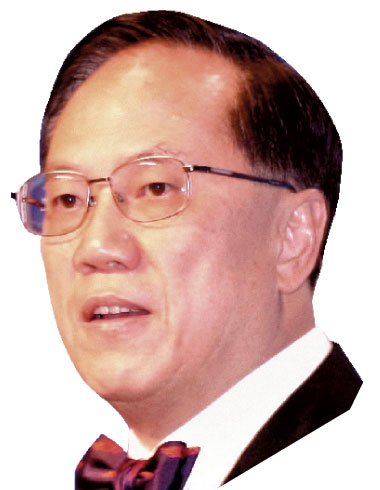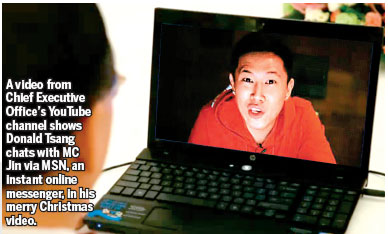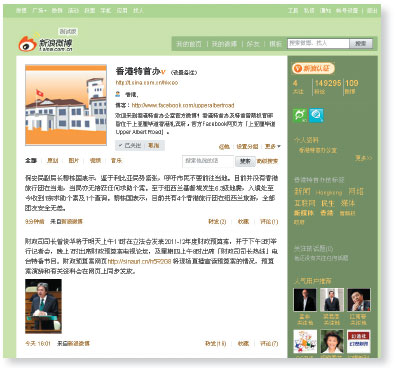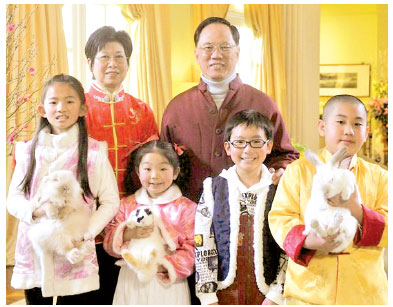Donald Tsang: you've got a message
Updated: 2011-02-25 07:52
By Kane Wu(HK Edition)
|
|||||||||

|
The Chief Executive Office's Sina micro blog page has engaged almost 15,000 followers. |
|
Donald Tsang and his wife appear in a video in Chief Executive Office's YouTube channel to wish Hong Kong people a happy and healthy Chinese new year. |

Hong Kong's chief executive, with his rather stiff public manner, wearing his trademark bow tie, hardly seems the sort to embrace social media. But Facebook, Sina and other social networking platforms are in important part of the his communication strategy. Kane Wu reports.
Kwok Ching didn't expect to hear from the government when she posted a letter to the Chief Executive (CE) Donald Tsang in January on his Facebook page.
The mother of a 10-month-old baby girl complained about the shortage of baby milk powder supplies in local stores, saying that the increasing number of buyers from the mainland have made it difficult for local parents to feed their babies.
The letter, posted in the discussion board of Upper Albert Road, official page of the CE's office on Facebook, drew immediate replies, including those from the CE's office itself.
"One of the suppliers has speeded up the shipment of their products by chartering extra airlines. Their milk products supply in February will be twice the amount as was shipped during the same period last year ... Suppliers and retailers have taken effective measures to cool down the market price and keep sufficient supply over the Chinese New Year," replied the page master.
"I don't know how the government will handle the problem but they did get back to me. At least they paid attention, which is better than nothing," Kwok Ching said.
In fact, the Upper Albert Road Facebook page is but one of the government's latest efforts in creating new channels of communication with the public. Since last year, the CE's office has opened a Facebook official page, a Sina micro blog account (the Chinese equivalent of Twitter), a YouTude video channel, and a special condolence website to the victims of the Manila crisis hostage, which has generated millions of visitors since the tragedy happened on August 23, 2010.
"Making use of social media is a matter of inevitability for the SAR government," Ronald Chan, special assistant to the CE's Office who is in charge of the social media team, tells China Daily in an exclusive interview.
Donald Tsang, as the major speaker on those social media sites, has been highly enthusiastic all along about his social media initiatives, Chan said.
"The CE is definitely the keenest user of iPad. You see him (Tsang) carry his iPad very often whenever he's traveling in his car. He likes to read Facebook page or the micro blog page for people's comments."
One particular video, in which Tsang, wearing his iconic bow tie, sings a merry Christmas rap song with popular rap singer MC Jin, attracted more than nine million views on the CE office's YouTude channel.
It took Chan and his team less than three weeks from the inception of the idea to finally posting the video online. MC Jin, an American-born Cantonese rapper who made quite a few hits back in the United States a few years ago, wrote the lyrics of the song that uses slogans from the Act Now campaign to wish citizens a merry Christmas and happy new year. Tsang spent half an hour filming his part of the music video, in which he uses MSN, a popular online instant messenger among young people, to chat with MC Jin.
The video generated much more responses than the government could have imagined. "Donald Tsang, please act more naturally!" some people commented. Meanwhile, more than a dozen satiric videos appeared on YouTude shortly after the original video was released. The CE was nicknamed Bow Tie Tsang in those videos, and his Act Now slogan was parodied into "super wrong", because their Chinese characters are quite similar.
Chan however says it's "perfectly OK". What's more important, in his view, is that "people are engaged in the issues and express comments".
You can see videos of Donald Tsang visiting new year markets, participating in volunteer activities, celebrating his birthday with his wife on the various social media accounts.
"We are very conscious that people look for something more interesting, more genuine. We try to strike a balance between these two categories of materials," Chan says.
The CE office's social media initiative started in 2010 in the Act Now Campaign on behalf of the constitutional reform packages. At the time, the government's Facebook page served as a base camp for the government's online promotion of the reform packages. "We put quite a lot of things there: senior officials' blogs, videos encouraging people to support the packages, and behind-the-scenes exercises the political accountability team engaged in," Chan says.
Several months since the successful passage of the reform packages, the Facebook page has engaged almost 25,000 fans while more than 146,000 people read updates from the CE's office's Sina micro blog account every day.
"You can tell from the local press that the CE's exposure has increased quite a bit with the advent of new media ... They always help us broaden the scope of our messages by reporting what we put on a Facebook page," he says.
"There's a wide spectrum of media recipients in a diverse society like Hong Kong. Social media is more influential on young people," Professor Huang Yu, head of the Department of Journalism at Hong Kong Baptist University, comments. "However, young people tend to be the most critical group towards the government."
"It helps sooth the tension between the public and the government, but it cannot solve deeply-rooted social problems," Huang adds.
Some people also question whether the social media accounts are more of a public relation promotion of the CE than an actual channel to address social issues.
"If I write a letter or email the government, the government has to get back to me as stipulated by the regulations, but what about my Facebook comments? They can be easily ignored," says Wong Chau-wai, a postgraduate student from Hong Kong Polytechnic University, who is actively engaged in the student union and other social affairs.
"We don't screen the messages. We allow people to have the freedom to express as many of their thoughts on a Facebook page or a micro blog page as possible," Chan responds. He and two other staffers spend quite a lot of time browsing through the massive quantity of messages every day and select those with common public concerns for specific replies. The CE himself and other officials also post video responses to certain issues once in a while.
"The government has all kinds of resources, thus social media should be the place where the public may express different opinions to the government," Huang says. "The Hong Kong government is heading towards the right direction."
The effect of social media, though, is "difficult to assess", according to Huang. "The free flow of information in the city means that the government can't change public opinion too much by using social media," he says. "You can just change your attitude and the mood of public amity with new approaches, unless you are someone as charismatic as Barack Obama."
It's just been a couple of months since the CE's office started using social media formally and heavily as a means of communication with the public, especially the younger community in Hong Kong. Chan admits there is still a lot to do. "We are still in the process of refining our strategies, upgrading initiatives. Along the way we would like to hear what people have to say, while also paying great attention to technological development," he says.
Chan and his team are reaching out for new platforms of communication with the public. No matter which avenues they choose to evolve their social media strategy, they want to make sure there is nothing fluffy.
"We try to tell people that the CE does genuinely care about people's lives and manifest his concerns about them," Chan says.
(HK Edition 02/25/2011 page4)

